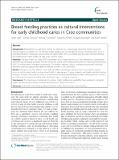Breast Feeding Practices as Cultural Interventions for Early Childhood Caries in Cree Communities
Metadata
Show full item recordAuthor
Cidro, Jaime
Zahayko, Lynelle
Lawrence, Herenia P.
Folster, Samantha
McGregor, Margaret
McKay, Kristen
Date
2015-04-09Citation
Cidro, Jaime, Lynelle Zahayko, Herenia P. Lawrence, Samantha Folster, Margaret McGregor, and Kristen McKay. “Breast Feeding Practices as Cultural Interventions for Early Childhood Caries in Cree Communities.” BMC Oral Health, 15(1) (2013): article no. 49. DOI: 10.1186/s12903-015-0027-5.
Abstract
Background: Breastfeeding is a gift from mother to child and has a wide range of positive health, social and cultural impacts on infants. The link between bottle feeding and the prevalence of early childhood caries (ECC) is well documented. In Aboriginal communities, the higher rates of ECC are linked with low rates of breast feeding and inappropriate infant feeding of high sugar content liquids.
Methods: The Baby Teeth Talk Study (BTT) is one project that is exploring the use of four interventions (motivational interviewing, anticipatory guidance, fluoride varnish and dental care to expectant mothers) for reducing the prevalence of ECC in infants within Aboriginal communities. This research explored cultural based practices through individual interviews and focus groups with older First Nations women in the community.
Results: Participants in a First Nations community identified cultural based practices that have also been used to promote healthy infant feeding and good oral health. A wide range of themes related to oral health and infant feeding emerged. However, this paper focusses on three themes including: breastfeeding attitudes, social support for mothers and birthing and supporting healthy infant feeding through community programs.
Conclusions: The importance of understanding cultural health traditions is essential for those working in oral public health capacities to ensure there is community acceptance of the interventions.

